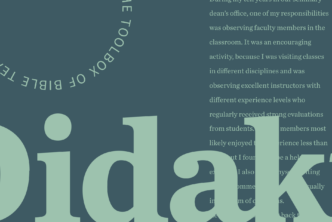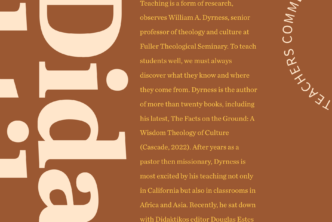by John H. Walton | Wheaton College
A hot topic of discussion these days is the conquest of the land recorded in Joshua. Skeptics find this a soft spot for attack as they rant about a genocidal God, criticize a violent Scripture, and challenge Christians about how they can serve a God who would do such a thing as command the annihilation of whole people groups. And Christians are getting the message loud and clear—they are confused and disillusioned when they find themselves unable to launch a defense. The answers are not found in insisting that God must have had a good reason for wiping out the Canaanites, who presumably deserved it. Good answers always start with careful analysis of culture, genre, and text, and so to those topics we turn our attention. Five points can be made to shift the focus concerning what the Bible is doing.
First, the meaning of the Hebrew word ḥerem, usually translated “utterly destroy” or “place under the ban,” needs to be reevaluated. It is a complicated word, but recent analysis suggests it has nothing to do with destruction. To designate something as ḥerem means it is ineligible for human use.1 Therefore, God consistently refers to “driving out” the peoples of the land, especially so the Israelites do not absorb them as slaves or wives. The land and the cities belong to God, so the inhabitants must be driven out (an act of eminent domain). The identity of those peoples in the land (not the persons) must be eliminated.
Second, the genre of conquest requires literary analysis. As just one of the important points, conquest accounts in the ancient world characteristically feature universalistic language. Taking this language seriously means not taking it literally. Throughout the literature of the ancient Near East, conquest accounts call for and claim total destruction, though it is clear (as in the case of Joshua) that this is not actually what happens or even what is attempted.2
Third, in the ancient literature we find a recurring motif across cultures and time periods of the “invincible barbarian” (in Akkadian labeled the “Umman-manda”). In the use of this motif all sorts of negative descriptions are used for threatening enemies. These descriptions are not accusations of actual behavior that could be documented. The biblical descriptions of the Canaanites fall into this category. One of the intriguing elements of this motif is that the opponents presumably can be defeated only by the gods.3
Fourth, from a theological perspective, we need to understand the nature of the land promise more clearly. One important perspective is that the conquest recapitulates creation and is an order-bringing event. A second is that it is to be Yahweh’s land, not Israel’s. It is Yahweh’s land specifically in the sense that he has chosen it as the place where he will dwell (as Deuteronomy puts it, the place where he will set his name; e.g., Deut 12:5). Israel is granted tenancy to serve as hosts to the divine presence.
Fifth, the status of the Canaanites, then, should not be understood as those who are guilty of heinous crimes; the characterization is rhetorical. Furthermore, some of the sentences need to be reexamined on several points. (Genesis 15:16 offers a notable example: The “sin” of the Amorites, when analyzed in the context of Genesis, should be understood as the calamity of destiny that has been decreed for them, not as sin that they have committed; cf. Gen 4:13; 19:15; 44:16). Once all the passages have been examined in close reading, it can be seen that the Canaanites are not being accused of wrongdoing.4
These points do not resolve our ethical concerns about the conquest; warfare, death, and violence remain realities.5 We do not expect the ancients to share our modern humanistic sensibilities, and we cannot assess the thoughts of God. But the events recorded in Joshua must not be confused with “holy war” or “jihad.” The conquest account is a literary-theological description of the nature of the Israelite covenant that is set in the logic of the ancient cognitive environment. It is not intended to be used as a study of applied ethics.
The application of the passage does not offer a pattern for a “just war” theory or provide justification for anyone’s battle, no matter how just the cause. Application is found, instead, in the covenant pattern it offers for driving out that which is inimical to the presence of God. For us, that means we drive out the “old man” and adopt our identity in Christ. We are crucified with Christ, yet we live.
This article was published in the July 2018 issue of Didaktikos: Journal of Theological Education.
Related resources
Here are some related Logos resources, including those referenced by Professor Walton:
- Leviticus 23–27 (Anchor Yale Bible) by Jacob Milgrom
- Ancient Conquest Accounts: A Study in Ancient Near Eastern and Biblical History Writing by K. Lawson Younger Jr.
- The Lost World of the Israelite Conquest: Covenant, Retribution, and the Fate of the Canaanites by John H. Walton and J. Harvey Walton
- Joshua (Evangelical Biblical Theology Commentary) by David G. Firth
- Jacob Milgrom, Leviticus 23–27, The Anchor Bible 3B (New York: Doubleday, 2001), 2418. See also Giuseppe F. Del Monte, “The Hittite ḥerem,” in Memorie Igor M. Diakonoff, Babel und Bibel 2 (Winona Lake: Eisenbrauns, 2005), 21–45.
- K. Lawson Younger, Ancient Conquest Accounts: A Study in Ancient Near Eastern and Biblical History Writing, Journal for the Study of the Old Testament: Supplement Series 98 (Sheffield: Sheffield Academic, 1990), 242–66.
- Sellim Ferruh Adal1, The Scourge of God: The Umman-Manda and Its Significance in the First Millennium BC, SAAS 20 (Helsinki: The Neo-Assyrian Text Corpus Project, 2011).
- John H. Walton and J. Harvey Walton, The Lost World of the Israelite Conquest (Downers Grove: IVP Academic, 2017).
- For further discussion on the five points above, see Walton and Walton, The Lost World of the Israelite Conquest.





